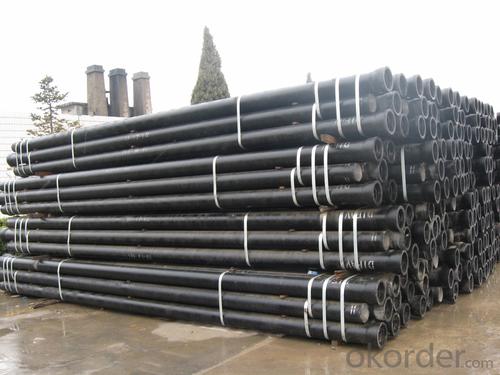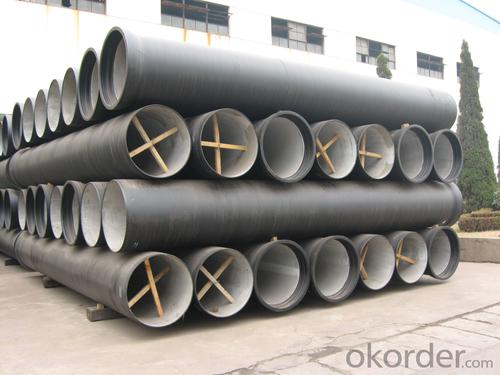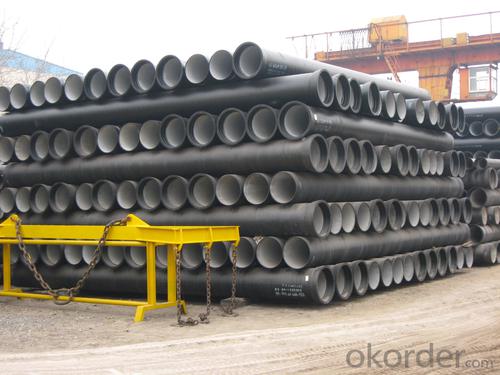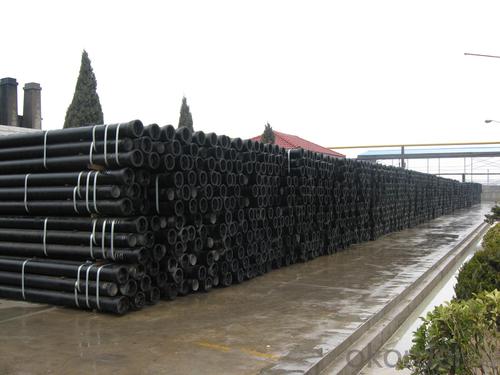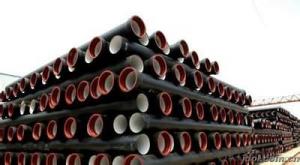DUCTILE IRON PIPE DN1100 K8/C/K9
- Loading Port:
- China Main Port
- Payment Terms:
- TT OR LC
- Min Order Qty:
- -
- Supply Capability:
- -
OKorder Service Pledge
OKorder Financial Service
You Might Also Like
Specification:
1) The standard of pipe: ISO2531:1998, K9
2) Effective length: 6m
3) Inner cement line: Portland cement line as per ISO4179
4) Zinc coating: at least 130g/m2 as per ISO8179
5) Bitumen painting: at least 70um as per ISO8179
6) With 100% quantity of NBR ring, or SBR ring, or EPDM ring as per ISO4633
7) DN80mm-800mm
8) High strength, lighter than grey iron, good corrosion resistance, no furring, small flow resistance, easy fixing, long life tome about 100 yeas
9) Produced by Hangzhou chunfeng machine
10) Checked by automatic inspection equipment
11) Composition:
Chemical composition | | | | |||
Chemical composition | Ductile Cast Iron Pipe (%) | Grey iron pipe (%) | Steel pipe (%) | | | |
C | 3.5-4.0 | 3.2-3.8 | 0.1-0.2 | | | |
Si | 1.9-2.6 | 1.4-2.2 | 0.15-0.4 | | | |
Mn | 0.15-0.45 | 0.4-0.6 | 0.3-0.6 | | | |
P | ≤0.06 | ≤0.3 | 0.02-0.03 | | | |
S | ≤0.02 | ≤0.1 | 0.02-0.03 | | | |
Mg | 0.03-0.06 |
|
| | | |
12) Feature:
Mechanical properties | | | | |||
| Ductile Cast Iron Pipe | Grey Iron Pipe | Steel Pipe | | | |
Tensile Strength(Mpa) | ≥420 | 150-260 | ≥400 | | | |
Yield Strength(Mpa) | ≥300 | No Confirmation | No Confirmation | | | |
Bending Strength(Mpa) | ≥590 | 200-360 | ≥400 | | | |
Elongation (%) | ≥10 | Neglected | ≥18 | | | |
Brinell Hardness(HBS) | ≤230 | ≤230 | About 140 | | | |
13) T type mechanical joint
14) Packing: in bulk or container
- Q: Can ductile iron pipes be used for irrigation systems in saline soil conditions?
- Ductile iron pipes, due to their durability and corrosion resistance, can be utilized for irrigation systems in saline soil conditions. These pipes are renowned for their ability to withstand various soil conditions, including saline soil, which is characterized by elevated salt levels that can lead to corrosion and material deterioration. However, ductile iron pipes possess a protective coating, such as cement mortar lining or polyethylene encasement, that provides an added layer of defense against corrosion. Consequently, they can endure the corrosive impacts of saline soil and maintain their structural integrity for an extended duration. Moreover, ductile iron pipes exhibit a high tensile strength, enabling them to resist cracks and breaks, which is crucial for irrigation systems necessitating a consistent and dependable water supply. Consequently, ductile iron pipes represent a viable option for irrigation systems operating in saline soil conditions.
- Q: An urban infrastructure construction, water supply pipe is ductile iron pipe and PE pipe, thank you
- Because the construction of municipal water supply pressure will be relatively large, generally used in the selection of pipe centrifugal ductile iron pipe, he has properties of iron essence and steel, excellent corrosion resistance, good ductility, good sealing effect, simple installation, ductile iron pipe is mainly used for municipal, industrial and mining enterprises, water supply, gas, oil etc.
- Q: Can ductile iron pipes be used for railway bridges?
- Indeed, railway bridges can utilize ductile iron pipes. Ductile iron, a resilient and sturdy form of cast iron, possesses remarkable tensile strength and flexibility. These characteristics render it suitable for a wide array of uses, railway bridges included. Ductile iron pipes serve as ideal building materials for various railway bridge elements, such as supports, beams, and columns, providing not only structural stability but also the ability to endure substantial loads and vibrations associated with railway traffic. Moreover, ductile iron pipes exhibit resistance to corrosion, a vital attribute for railway bridges that face exposure to outdoor conditions. Consequently, ductile iron pipes represent a viable and effective choice for constructing railway bridges.
- Q: What are the different methods for testing ductile iron pipe?
- There are several methods available for testing ductile iron pipe to ensure its quality and reliability. These methods include: 1. Hydrostatic Testing: This is the most common method used for testing ductile iron pipe. It involves filling the pipe with water and pressurizing it to a specified level. The pipe is then inspected for any leaks or deformations under the applied pressure. Hydrostatic testing helps determine the pipe's ability to withstand internal pressure without failure. 2. Tensile Testing: This method involves subjecting a sample of the ductile iron pipe to a gradually increasing tensile load until it fractures. The test measures the ultimate tensile strength, yield strength, and elongation of the material. Tensile testing helps evaluate the pipe's mechanical properties and its ability to withstand tension without breaking. 3. Hardness Testing: This method measures the hardness of the ductile iron pipe using various techniques such as Brinell, Rockwell, or Vickers hardness tests. Hardness testing provides information about the material's resistance to deformation, wear, and fatigue. It helps assess the pipe's durability and resistance to external forces. 4. Impact Testing: This method involves striking a notched sample of the ductile iron pipe with a pendulum or falling weight to measure its impact resistance. The test determines the material's ability to absorb energy during sudden loading or impact. Impact testing helps evaluate the pipe's ability to withstand accidental impacts or dynamic loads. 5. Ultrasonic Testing: This non-destructive testing method uses high-frequency sound waves to detect internal defects or discontinuities in the ductile iron pipe. Ultrasonic testing can identify voids, cracks, or inclusions that may affect the pipe's structural integrity. It helps ensure the pipe's soundness and reliability. 6. Magnetic Particle Testing: This method is primarily used for detecting surface or near-surface defects in the ductile iron pipe. It involves applying a magnetic field to the pipe and then applying magnetic particles to the surface. Any defects present will cause the magnetic particles to gather and form visible indications. Magnetic particle testing helps identify surface cracks, laps, or other defects that may affect the pipe's performance. These different testing methods help ensure that ductile iron pipe meets industry standards and specifications, ensuring its quality and reliability in various applications.
- Q: Luo what effect of ductile cast iron
- Chromium can improve the hardness, strength and wear resistance of nodular iron, and increase bainite in bainite ductile iron.
- Q: Does the cast iron have size 250? What's the performance?
- Ductile iron does not have size 250. Ductile iron is the beginning of QT, QT400-15, QT450-10, QT500-7 is the general use of nodular cast iron brand. Nodular cast iron welding can be determined, this should be in some high strength cast iron equipment used more, the tensile strength of normally ductile cast iron welding in welding is higher, is worse than the grey cast iron, it is actually very difficult to distinguish with the naked eye is ductile iron or cast iron the iron in the repair equipment, we usually use WE777 special cast iron electrode universal wide welding, but it is only for maintenance use, the effect is really good, reducing the risk of cracking and high strength welding rod matching to ensure the strength of welding seam.
- Q: How much is the working pressure of ductile iron pipe used in water supply pipe and how is MPa determined?
- No, the work pressure is generally 0.4~1.6MPa, but the ultimate test pressure of ductile iron pipes is about 4.0MPa.
- Q: Are ductile iron pipes suitable for use in cooling water systems?
- Yes, ductile iron pipes are suitable for use in cooling water systems. They offer excellent strength, durability, and corrosion resistance, making them ideal for transporting water at varying temperatures. Additionally, their flexibility allows them to withstand pressure and temperature changes, ensuring long-lasting and reliable performance in cooling water applications.
- Q: How do ductile iron pipes handle ground movement due to tree roots?
- Ductile iron pipes possess a robust and enduring nature, rendering them exceptionally resilient against ground movement induced by tree roots. The flexibility of ductile iron enables it to endure the pressure exerted by growing tree roots without fracturing or breaking. This capability is attributed to the material's aptitude for absorbing and dispersing stress, thereby minimizing the impact of ground movement. Furthermore, ductile iron pipes exhibit a sleek inner surface that diminishes the likelihood of tree roots infiltrating. The firmly sealed joints between the pipes likewise prevent root penetration and subsequent harm. In cases where tree roots do manage to infiltrate the soil and make contact with ductile iron pipes, their resistance to corrosion offers an additional advantage. Ductile iron pipes are coated with a protective layer that thwarts the formation of rust and corrosion, guaranteeing their long lifespan and structural integrity. Nevertheless, it is imperative to acknowledge that despite the high resistance of ductile iron pipes to ground movement caused by tree roots, regular inspection and maintenance are still advisable. This facilitates early detection and the necessary execution of repairs if any root infiltration or damage is identified.
- Q: Is the water cast iron pipe 100% for hydrostatic test?
- Domestic manufacturers, such as steel group wing ductile iron pipe limited liability company, Xinxing Ductile iron pipes, Saint Gobain pipe is 100% factory test pressure, test pressure in 3.2-5.0MPa according to different specifications.
Send your message to us
DUCTILE IRON PIPE DN1100 K8/C/K9
- Loading Port:
- China Main Port
- Payment Terms:
- TT OR LC
- Min Order Qty:
- -
- Supply Capability:
- -
OKorder Service Pledge
OKorder Financial Service
Similar products
Hot products
Hot Searches
Related keywords




